MMH352 International HRM: Naturo Condiments in Australia & Japan
VerifiedAdded on 2023/06/14
|15
|4048
|167
Essay
AI Summary
This essay analyzes the international human resource management (IHRM) strategies of an Australian company, Naturo Condiments, operating in Tokyo, Japan. It emphasizes the cultural differences influencing HRM, using Hofstede's Cultural Dimensions to compare Australia and Japan across power distance, individualism, masculinity, uncertainty avoidance, long-term orientation, and indulgence. The analysis highlights how these cultural variations impact Naturo Condiments' business decisions, particularly in managing local employees in Japan, and underscores the importance of adapting HRM practices to align with Japanese cultural norms for effective cross-cultural management and operational success. Desklib provides access to similar solved assignments and past papers for students.
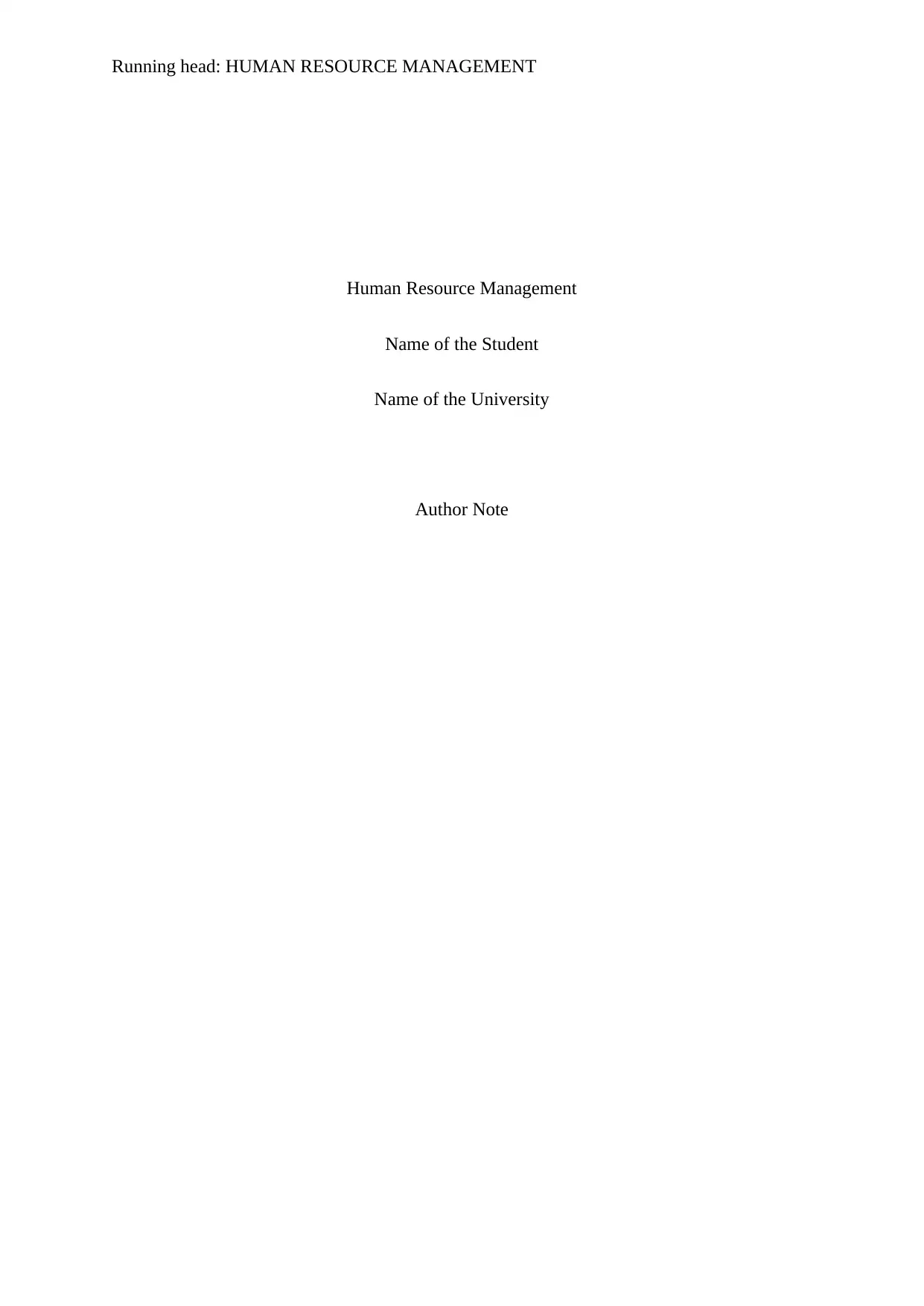
Running head: HUMAN RESOURCE MANAGEMENT
Human Resource Management
Name of the Student
Name of the University
Author Note
Human Resource Management
Name of the Student
Name of the University
Author Note
Paraphrase This Document
Need a fresh take? Get an instant paraphrase of this document with our AI Paraphraser
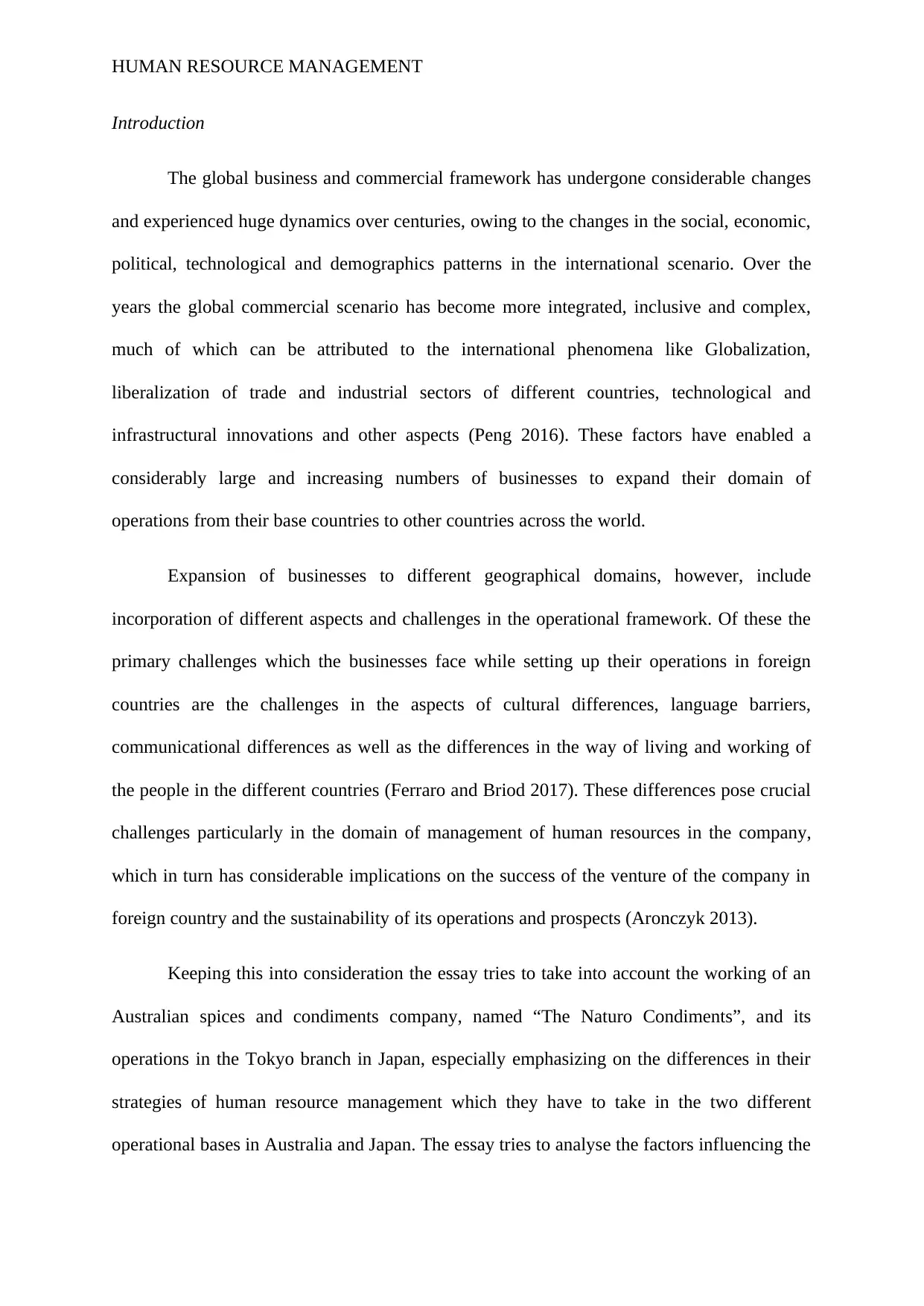
HUMAN RESOURCE MANAGEMENT
Introduction
The global business and commercial framework has undergone considerable changes
and experienced huge dynamics over centuries, owing to the changes in the social, economic,
political, technological and demographics patterns in the international scenario. Over the
years the global commercial scenario has become more integrated, inclusive and complex,
much of which can be attributed to the international phenomena like Globalization,
liberalization of trade and industrial sectors of different countries, technological and
infrastructural innovations and other aspects (Peng 2016). These factors have enabled a
considerably large and increasing numbers of businesses to expand their domain of
operations from their base countries to other countries across the world.
Expansion of businesses to different geographical domains, however, include
incorporation of different aspects and challenges in the operational framework. Of these the
primary challenges which the businesses face while setting up their operations in foreign
countries are the challenges in the aspects of cultural differences, language barriers,
communicational differences as well as the differences in the way of living and working of
the people in the different countries (Ferraro and Briod 2017). These differences pose crucial
challenges particularly in the domain of management of human resources in the company,
which in turn has considerable implications on the success of the venture of the company in
foreign country and the sustainability of its operations and prospects (Aronczyk 2013).
Keeping this into consideration the essay tries to take into account the working of an
Australian spices and condiments company, named “The Naturo Condiments”, and its
operations in the Tokyo branch in Japan, especially emphasizing on the differences in their
strategies of human resource management which they have to take in the two different
operational bases in Australia and Japan. The essay tries to analyse the factors influencing the
Introduction
The global business and commercial framework has undergone considerable changes
and experienced huge dynamics over centuries, owing to the changes in the social, economic,
political, technological and demographics patterns in the international scenario. Over the
years the global commercial scenario has become more integrated, inclusive and complex,
much of which can be attributed to the international phenomena like Globalization,
liberalization of trade and industrial sectors of different countries, technological and
infrastructural innovations and other aspects (Peng 2016). These factors have enabled a
considerably large and increasing numbers of businesses to expand their domain of
operations from their base countries to other countries across the world.
Expansion of businesses to different geographical domains, however, include
incorporation of different aspects and challenges in the operational framework. Of these the
primary challenges which the businesses face while setting up their operations in foreign
countries are the challenges in the aspects of cultural differences, language barriers,
communicational differences as well as the differences in the way of living and working of
the people in the different countries (Ferraro and Briod 2017). These differences pose crucial
challenges particularly in the domain of management of human resources in the company,
which in turn has considerable implications on the success of the venture of the company in
foreign country and the sustainability of its operations and prospects (Aronczyk 2013).
Keeping this into consideration the essay tries to take into account the working of an
Australian spices and condiments company, named “The Naturo Condiments”, and its
operations in the Tokyo branch in Japan, especially emphasizing on the differences in their
strategies of human resource management which they have to take in the two different
operational bases in Australia and Japan. The essay tries to analyse the factors influencing the
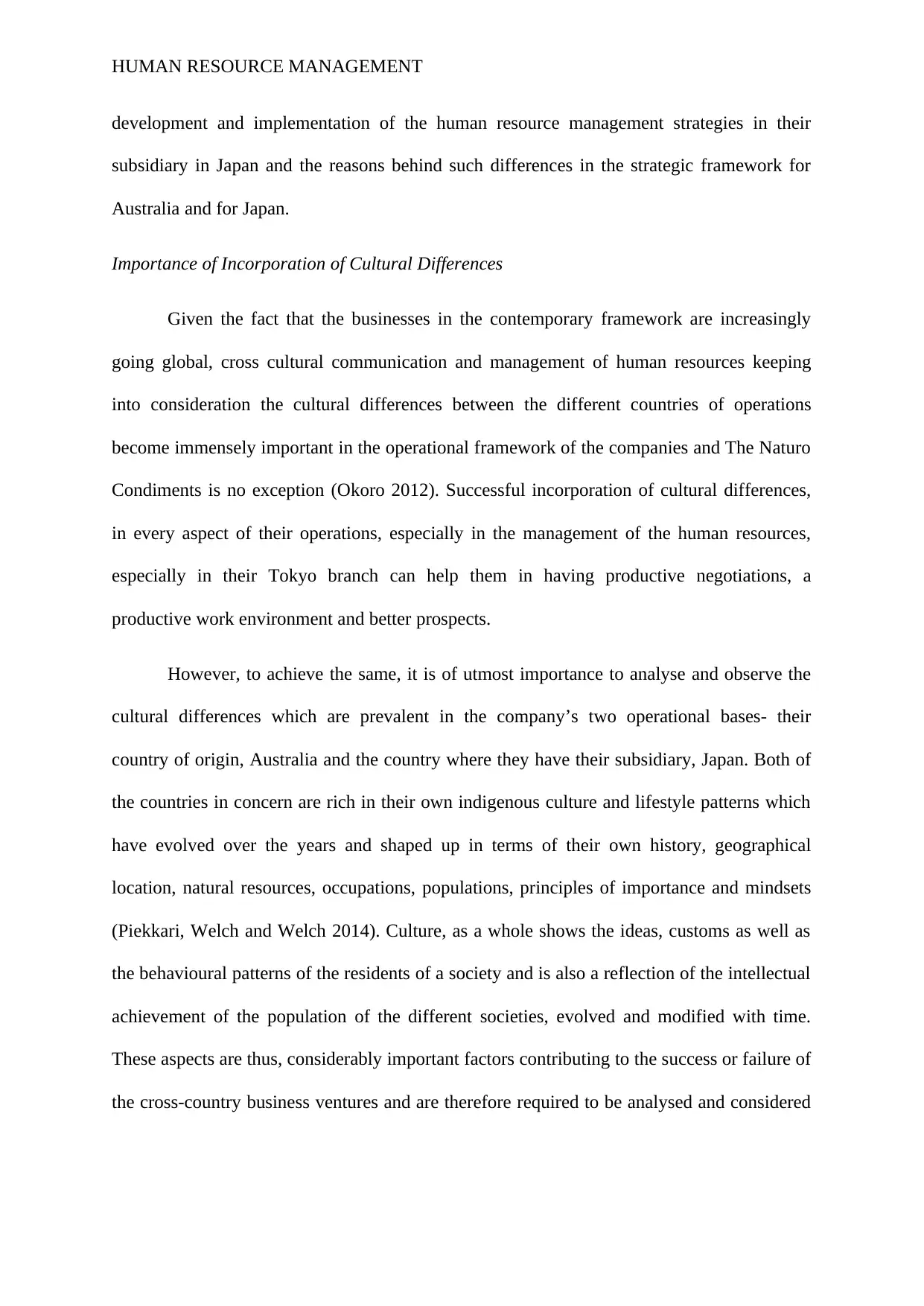
HUMAN RESOURCE MANAGEMENT
development and implementation of the human resource management strategies in their
subsidiary in Japan and the reasons behind such differences in the strategic framework for
Australia and for Japan.
Importance of Incorporation of Cultural Differences
Given the fact that the businesses in the contemporary framework are increasingly
going global, cross cultural communication and management of human resources keeping
into consideration the cultural differences between the different countries of operations
become immensely important in the operational framework of the companies and The Naturo
Condiments is no exception (Okoro 2012). Successful incorporation of cultural differences,
in every aspect of their operations, especially in the management of the human resources,
especially in their Tokyo branch can help them in having productive negotiations, a
productive work environment and better prospects.
However, to achieve the same, it is of utmost importance to analyse and observe the
cultural differences which are prevalent in the company’s two operational bases- their
country of origin, Australia and the country where they have their subsidiary, Japan. Both of
the countries in concern are rich in their own indigenous culture and lifestyle patterns which
have evolved over the years and shaped up in terms of their own history, geographical
location, natural resources, occupations, populations, principles of importance and mindsets
(Piekkari, Welch and Welch 2014). Culture, as a whole shows the ideas, customs as well as
the behavioural patterns of the residents of a society and is also a reflection of the intellectual
achievement of the population of the different societies, evolved and modified with time.
These aspects are thus, considerably important factors contributing to the success or failure of
the cross-country business ventures and are therefore required to be analysed and considered
development and implementation of the human resource management strategies in their
subsidiary in Japan and the reasons behind such differences in the strategic framework for
Australia and for Japan.
Importance of Incorporation of Cultural Differences
Given the fact that the businesses in the contemporary framework are increasingly
going global, cross cultural communication and management of human resources keeping
into consideration the cultural differences between the different countries of operations
become immensely important in the operational framework of the companies and The Naturo
Condiments is no exception (Okoro 2012). Successful incorporation of cultural differences,
in every aspect of their operations, especially in the management of the human resources,
especially in their Tokyo branch can help them in having productive negotiations, a
productive work environment and better prospects.
However, to achieve the same, it is of utmost importance to analyse and observe the
cultural differences which are prevalent in the company’s two operational bases- their
country of origin, Australia and the country where they have their subsidiary, Japan. Both of
the countries in concern are rich in their own indigenous culture and lifestyle patterns which
have evolved over the years and shaped up in terms of their own history, geographical
location, natural resources, occupations, populations, principles of importance and mindsets
(Piekkari, Welch and Welch 2014). Culture, as a whole shows the ideas, customs as well as
the behavioural patterns of the residents of a society and is also a reflection of the intellectual
achievement of the population of the different societies, evolved and modified with time.
These aspects are thus, considerably important factors contributing to the success or failure of
the cross-country business ventures and are therefore required to be analysed and considered
⊘ This is a preview!⊘
Do you want full access?
Subscribe today to unlock all pages.

Trusted by 1+ million students worldwide
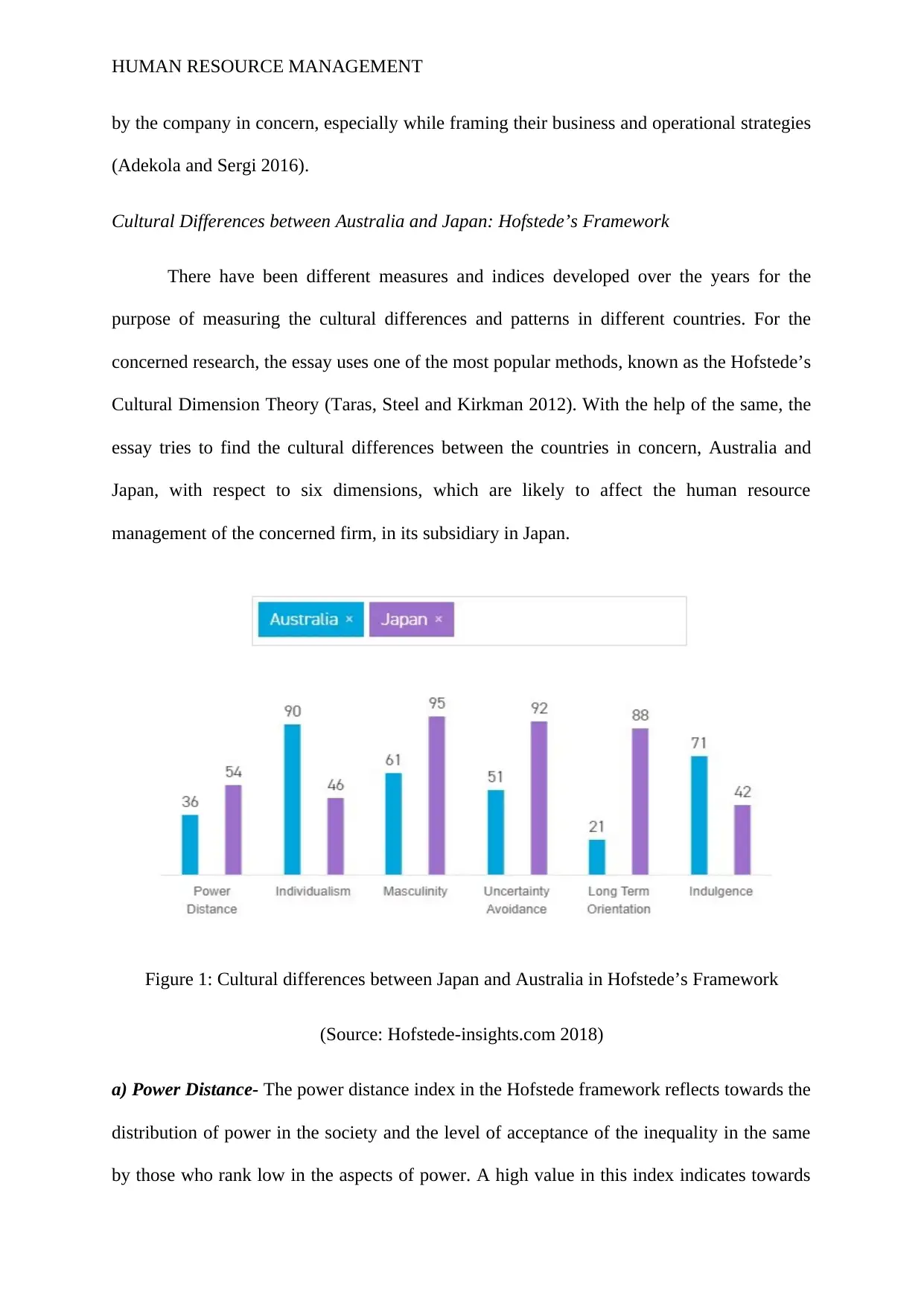
HUMAN RESOURCE MANAGEMENT
by the company in concern, especially while framing their business and operational strategies
(Adekola and Sergi 2016).
Cultural Differences between Australia and Japan: Hofstede’s Framework
There have been different measures and indices developed over the years for the
purpose of measuring the cultural differences and patterns in different countries. For the
concerned research, the essay uses one of the most popular methods, known as the Hofstede’s
Cultural Dimension Theory (Taras, Steel and Kirkman 2012). With the help of the same, the
essay tries to find the cultural differences between the countries in concern, Australia and
Japan, with respect to six dimensions, which are likely to affect the human resource
management of the concerned firm, in its subsidiary in Japan.
Figure 1: Cultural differences between Japan and Australia in Hofstede’s Framework
(Source: Hofstede-insights.com 2018)
a) Power Distance- The power distance index in the Hofstede framework reflects towards the
distribution of power in the society and the level of acceptance of the inequality in the same
by those who rank low in the aspects of power. A high value in this index indicates towards
by the company in concern, especially while framing their business and operational strategies
(Adekola and Sergi 2016).
Cultural Differences between Australia and Japan: Hofstede’s Framework
There have been different measures and indices developed over the years for the
purpose of measuring the cultural differences and patterns in different countries. For the
concerned research, the essay uses one of the most popular methods, known as the Hofstede’s
Cultural Dimension Theory (Taras, Steel and Kirkman 2012). With the help of the same, the
essay tries to find the cultural differences between the countries in concern, Australia and
Japan, with respect to six dimensions, which are likely to affect the human resource
management of the concerned firm, in its subsidiary in Japan.
Figure 1: Cultural differences between Japan and Australia in Hofstede’s Framework
(Source: Hofstede-insights.com 2018)
a) Power Distance- The power distance index in the Hofstede framework reflects towards the
distribution of power in the society and the level of acceptance of the inequality in the same
by those who rank low in the aspects of power. A high value in this index indicates towards
Paraphrase This Document
Need a fresh take? Get an instant paraphrase of this document with our AI Paraphraser
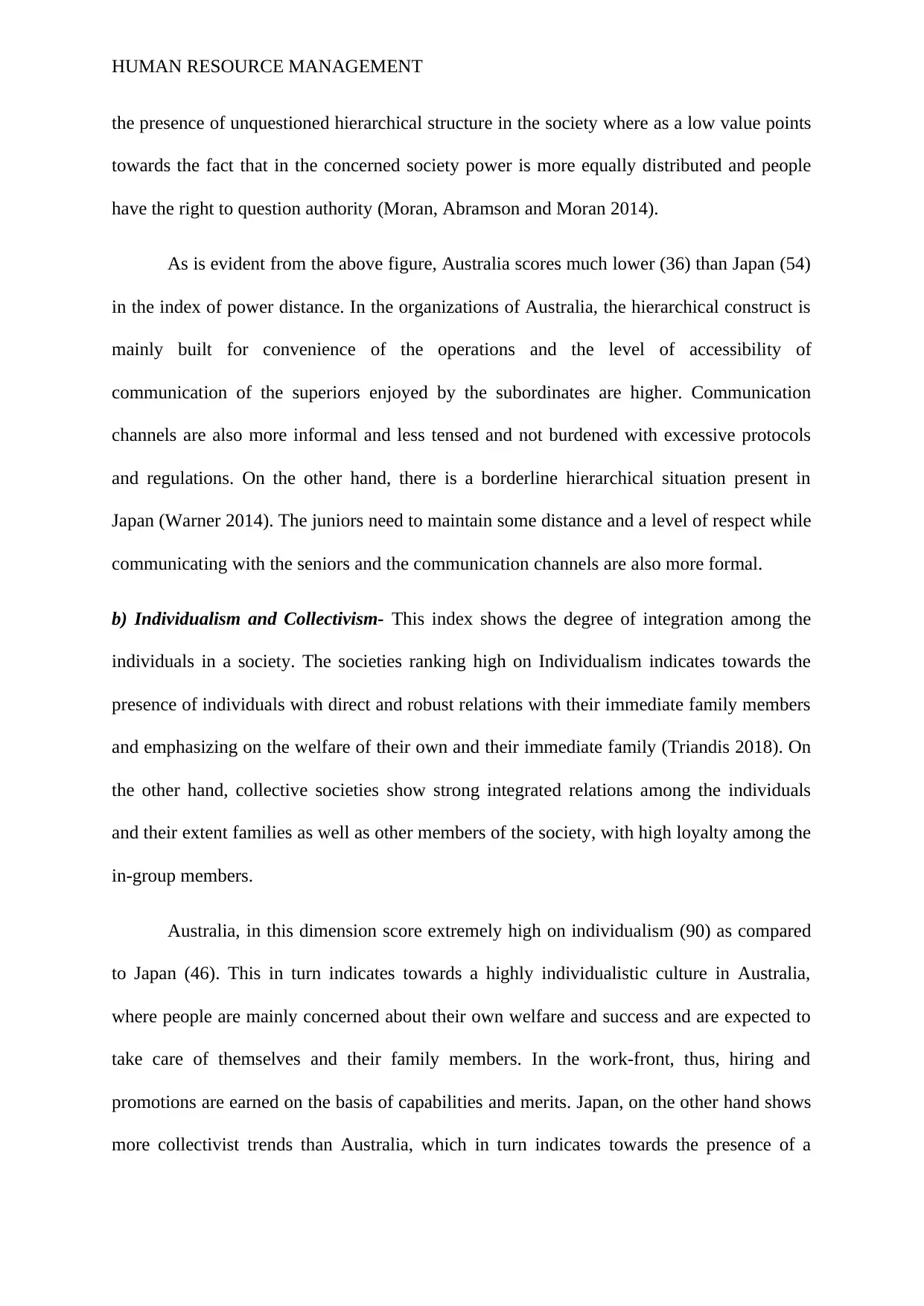
HUMAN RESOURCE MANAGEMENT
the presence of unquestioned hierarchical structure in the society where as a low value points
towards the fact that in the concerned society power is more equally distributed and people
have the right to question authority (Moran, Abramson and Moran 2014).
As is evident from the above figure, Australia scores much lower (36) than Japan (54)
in the index of power distance. In the organizations of Australia, the hierarchical construct is
mainly built for convenience of the operations and the level of accessibility of
communication of the superiors enjoyed by the subordinates are higher. Communication
channels are also more informal and less tensed and not burdened with excessive protocols
and regulations. On the other hand, there is a borderline hierarchical situation present in
Japan (Warner 2014). The juniors need to maintain some distance and a level of respect while
communicating with the seniors and the communication channels are also more formal.
b) Individualism and Collectivism- This index shows the degree of integration among the
individuals in a society. The societies ranking high on Individualism indicates towards the
presence of individuals with direct and robust relations with their immediate family members
and emphasizing on the welfare of their own and their immediate family (Triandis 2018). On
the other hand, collective societies show strong integrated relations among the individuals
and their extent families as well as other members of the society, with high loyalty among the
in-group members.
Australia, in this dimension score extremely high on individualism (90) as compared
to Japan (46). This in turn indicates towards a highly individualistic culture in Australia,
where people are mainly concerned about their own welfare and success and are expected to
take care of themselves and their family members. In the work-front, thus, hiring and
promotions are earned on the basis of capabilities and merits. Japan, on the other hand shows
more collectivist trends than Australia, which in turn indicates towards the presence of a
the presence of unquestioned hierarchical structure in the society where as a low value points
towards the fact that in the concerned society power is more equally distributed and people
have the right to question authority (Moran, Abramson and Moran 2014).
As is evident from the above figure, Australia scores much lower (36) than Japan (54)
in the index of power distance. In the organizations of Australia, the hierarchical construct is
mainly built for convenience of the operations and the level of accessibility of
communication of the superiors enjoyed by the subordinates are higher. Communication
channels are also more informal and less tensed and not burdened with excessive protocols
and regulations. On the other hand, there is a borderline hierarchical situation present in
Japan (Warner 2014). The juniors need to maintain some distance and a level of respect while
communicating with the seniors and the communication channels are also more formal.
b) Individualism and Collectivism- This index shows the degree of integration among the
individuals in a society. The societies ranking high on Individualism indicates towards the
presence of individuals with direct and robust relations with their immediate family members
and emphasizing on the welfare of their own and their immediate family (Triandis 2018). On
the other hand, collective societies show strong integrated relations among the individuals
and their extent families as well as other members of the society, with high loyalty among the
in-group members.
Australia, in this dimension score extremely high on individualism (90) as compared
to Japan (46). This in turn indicates towards a highly individualistic culture in Australia,
where people are mainly concerned about their own welfare and success and are expected to
take care of themselves and their family members. In the work-front, thus, hiring and
promotions are earned on the basis of capabilities and merits. Japan, on the other hand shows
more collectivist trends than Australia, which in turn indicates towards the presence of a
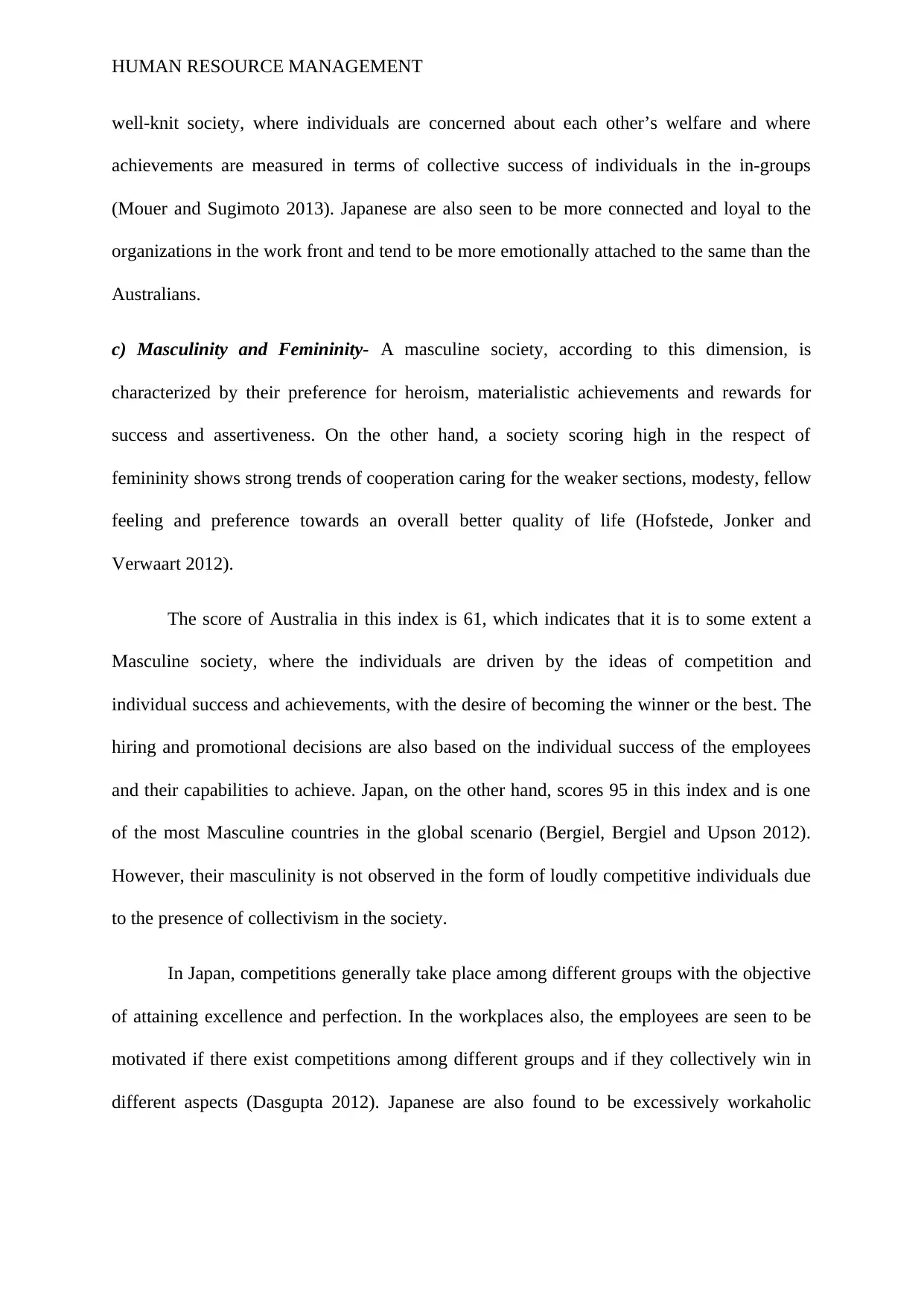
HUMAN RESOURCE MANAGEMENT
well-knit society, where individuals are concerned about each other’s welfare and where
achievements are measured in terms of collective success of individuals in the in-groups
(Mouer and Sugimoto 2013). Japanese are also seen to be more connected and loyal to the
organizations in the work front and tend to be more emotionally attached to the same than the
Australians.
c) Masculinity and Femininity- A masculine society, according to this dimension, is
characterized by their preference for heroism, materialistic achievements and rewards for
success and assertiveness. On the other hand, a society scoring high in the respect of
femininity shows strong trends of cooperation caring for the weaker sections, modesty, fellow
feeling and preference towards an overall better quality of life (Hofstede, Jonker and
Verwaart 2012).
The score of Australia in this index is 61, which indicates that it is to some extent a
Masculine society, where the individuals are driven by the ideas of competition and
individual success and achievements, with the desire of becoming the winner or the best. The
hiring and promotional decisions are also based on the individual success of the employees
and their capabilities to achieve. Japan, on the other hand, scores 95 in this index and is one
of the most Masculine countries in the global scenario (Bergiel, Bergiel and Upson 2012).
However, their masculinity is not observed in the form of loudly competitive individuals due
to the presence of collectivism in the society.
In Japan, competitions generally take place among different groups with the objective
of attaining excellence and perfection. In the workplaces also, the employees are seen to be
motivated if there exist competitions among different groups and if they collectively win in
different aspects (Dasgupta 2012). Japanese are also found to be excessively workaholic
well-knit society, where individuals are concerned about each other’s welfare and where
achievements are measured in terms of collective success of individuals in the in-groups
(Mouer and Sugimoto 2013). Japanese are also seen to be more connected and loyal to the
organizations in the work front and tend to be more emotionally attached to the same than the
Australians.
c) Masculinity and Femininity- A masculine society, according to this dimension, is
characterized by their preference for heroism, materialistic achievements and rewards for
success and assertiveness. On the other hand, a society scoring high in the respect of
femininity shows strong trends of cooperation caring for the weaker sections, modesty, fellow
feeling and preference towards an overall better quality of life (Hofstede, Jonker and
Verwaart 2012).
The score of Australia in this index is 61, which indicates that it is to some extent a
Masculine society, where the individuals are driven by the ideas of competition and
individual success and achievements, with the desire of becoming the winner or the best. The
hiring and promotional decisions are also based on the individual success of the employees
and their capabilities to achieve. Japan, on the other hand, scores 95 in this index and is one
of the most Masculine countries in the global scenario (Bergiel, Bergiel and Upson 2012).
However, their masculinity is not observed in the form of loudly competitive individuals due
to the presence of collectivism in the society.
In Japan, competitions generally take place among different groups with the objective
of attaining excellence and perfection. In the workplaces also, the employees are seen to be
motivated if there exist competitions among different groups and if they collectively win in
different aspects (Dasgupta 2012). Japanese are also found to be excessively workaholic
⊘ This is a preview!⊘
Do you want full access?
Subscribe today to unlock all pages.

Trusted by 1+ million students worldwide
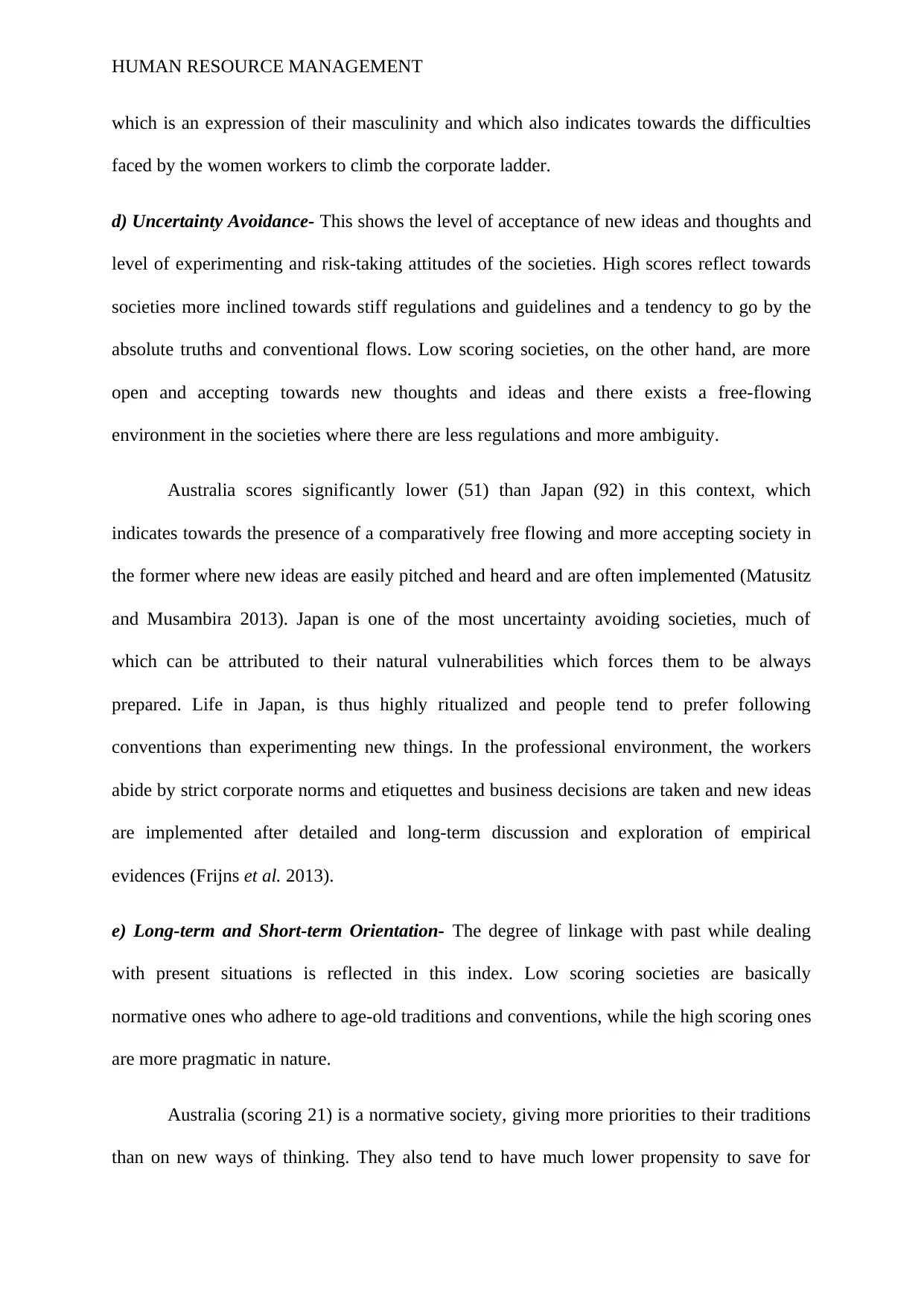
HUMAN RESOURCE MANAGEMENT
which is an expression of their masculinity and which also indicates towards the difficulties
faced by the women workers to climb the corporate ladder.
d) Uncertainty Avoidance- This shows the level of acceptance of new ideas and thoughts and
level of experimenting and risk-taking attitudes of the societies. High scores reflect towards
societies more inclined towards stiff regulations and guidelines and a tendency to go by the
absolute truths and conventional flows. Low scoring societies, on the other hand, are more
open and accepting towards new thoughts and ideas and there exists a free-flowing
environment in the societies where there are less regulations and more ambiguity.
Australia scores significantly lower (51) than Japan (92) in this context, which
indicates towards the presence of a comparatively free flowing and more accepting society in
the former where new ideas are easily pitched and heard and are often implemented (Matusitz
and Musambira 2013). Japan is one of the most uncertainty avoiding societies, much of
which can be attributed to their natural vulnerabilities which forces them to be always
prepared. Life in Japan, is thus highly ritualized and people tend to prefer following
conventions than experimenting new things. In the professional environment, the workers
abide by strict corporate norms and etiquettes and business decisions are taken and new ideas
are implemented after detailed and long-term discussion and exploration of empirical
evidences (Frijns et al. 2013).
e) Long-term and Short-term Orientation- The degree of linkage with past while dealing
with present situations is reflected in this index. Low scoring societies are basically
normative ones who adhere to age-old traditions and conventions, while the high scoring ones
are more pragmatic in nature.
Australia (scoring 21) is a normative society, giving more priorities to their traditions
than on new ways of thinking. They also tend to have much lower propensity to save for
which is an expression of their masculinity and which also indicates towards the difficulties
faced by the women workers to climb the corporate ladder.
d) Uncertainty Avoidance- This shows the level of acceptance of new ideas and thoughts and
level of experimenting and risk-taking attitudes of the societies. High scores reflect towards
societies more inclined towards stiff regulations and guidelines and a tendency to go by the
absolute truths and conventional flows. Low scoring societies, on the other hand, are more
open and accepting towards new thoughts and ideas and there exists a free-flowing
environment in the societies where there are less regulations and more ambiguity.
Australia scores significantly lower (51) than Japan (92) in this context, which
indicates towards the presence of a comparatively free flowing and more accepting society in
the former where new ideas are easily pitched and heard and are often implemented (Matusitz
and Musambira 2013). Japan is one of the most uncertainty avoiding societies, much of
which can be attributed to their natural vulnerabilities which forces them to be always
prepared. Life in Japan, is thus highly ritualized and people tend to prefer following
conventions than experimenting new things. In the professional environment, the workers
abide by strict corporate norms and etiquettes and business decisions are taken and new ideas
are implemented after detailed and long-term discussion and exploration of empirical
evidences (Frijns et al. 2013).
e) Long-term and Short-term Orientation- The degree of linkage with past while dealing
with present situations is reflected in this index. Low scoring societies are basically
normative ones who adhere to age-old traditions and conventions, while the high scoring ones
are more pragmatic in nature.
Australia (scoring 21) is a normative society, giving more priorities to their traditions
than on new ways of thinking. They also tend to have much lower propensity to save for
Paraphrase This Document
Need a fresh take? Get an instant paraphrase of this document with our AI Paraphraser
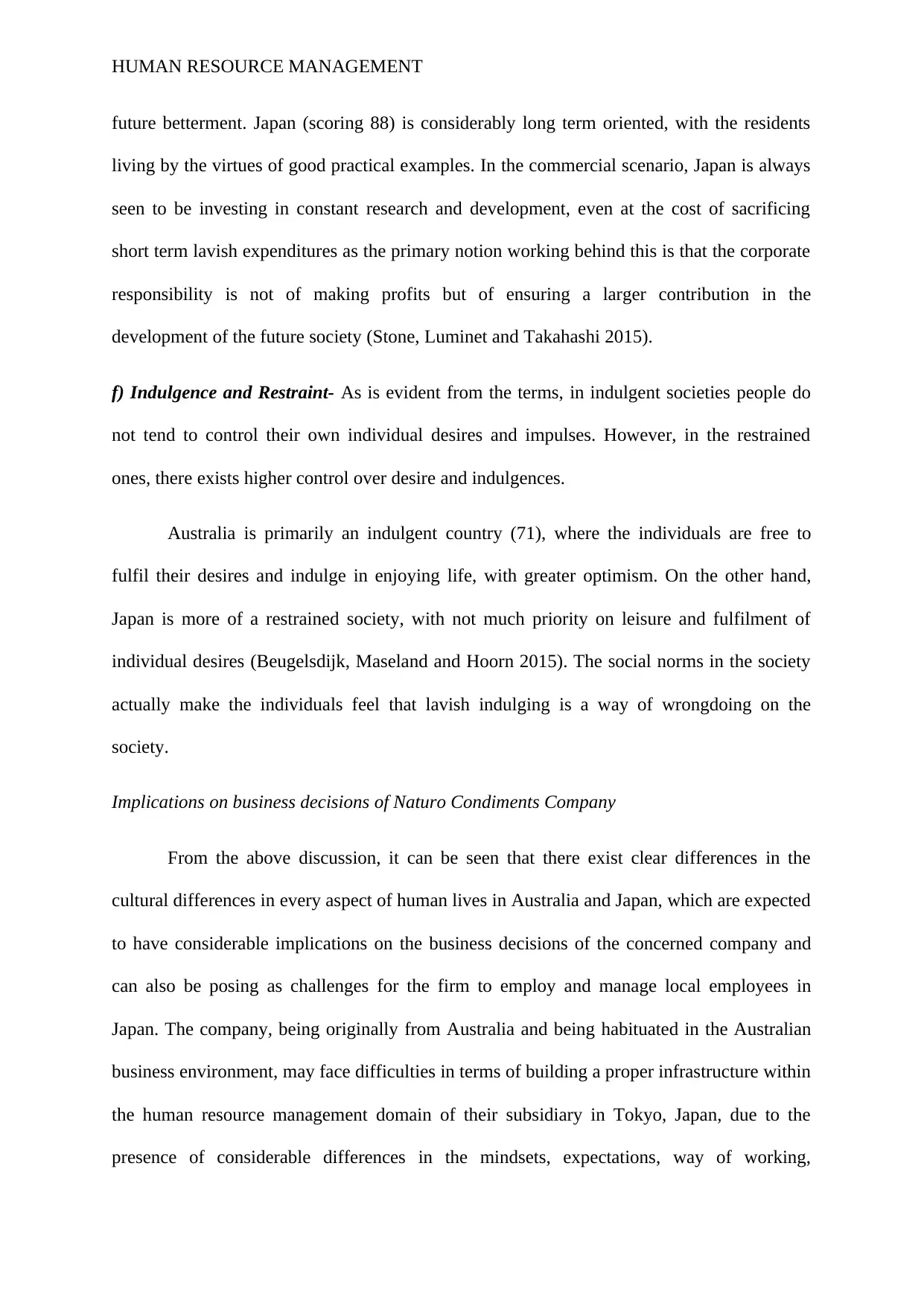
HUMAN RESOURCE MANAGEMENT
future betterment. Japan (scoring 88) is considerably long term oriented, with the residents
living by the virtues of good practical examples. In the commercial scenario, Japan is always
seen to be investing in constant research and development, even at the cost of sacrificing
short term lavish expenditures as the primary notion working behind this is that the corporate
responsibility is not of making profits but of ensuring a larger contribution in the
development of the future society (Stone, Luminet and Takahashi 2015).
f) Indulgence and Restraint- As is evident from the terms, in indulgent societies people do
not tend to control their own individual desires and impulses. However, in the restrained
ones, there exists higher control over desire and indulgences.
Australia is primarily an indulgent country (71), where the individuals are free to
fulfil their desires and indulge in enjoying life, with greater optimism. On the other hand,
Japan is more of a restrained society, with not much priority on leisure and fulfilment of
individual desires (Beugelsdijk, Maseland and Hoorn 2015). The social norms in the society
actually make the individuals feel that lavish indulging is a way of wrongdoing on the
society.
Implications on business decisions of Naturo Condiments Company
From the above discussion, it can be seen that there exist clear differences in the
cultural differences in every aspect of human lives in Australia and Japan, which are expected
to have considerable implications on the business decisions of the concerned company and
can also be posing as challenges for the firm to employ and manage local employees in
Japan. The company, being originally from Australia and being habituated in the Australian
business environment, may face difficulties in terms of building a proper infrastructure within
the human resource management domain of their subsidiary in Tokyo, Japan, due to the
presence of considerable differences in the mindsets, expectations, way of working,
future betterment. Japan (scoring 88) is considerably long term oriented, with the residents
living by the virtues of good practical examples. In the commercial scenario, Japan is always
seen to be investing in constant research and development, even at the cost of sacrificing
short term lavish expenditures as the primary notion working behind this is that the corporate
responsibility is not of making profits but of ensuring a larger contribution in the
development of the future society (Stone, Luminet and Takahashi 2015).
f) Indulgence and Restraint- As is evident from the terms, in indulgent societies people do
not tend to control their own individual desires and impulses. However, in the restrained
ones, there exists higher control over desire and indulgences.
Australia is primarily an indulgent country (71), where the individuals are free to
fulfil their desires and indulge in enjoying life, with greater optimism. On the other hand,
Japan is more of a restrained society, with not much priority on leisure and fulfilment of
individual desires (Beugelsdijk, Maseland and Hoorn 2015). The social norms in the society
actually make the individuals feel that lavish indulging is a way of wrongdoing on the
society.
Implications on business decisions of Naturo Condiments Company
From the above discussion, it can be seen that there exist clear differences in the
cultural differences in every aspect of human lives in Australia and Japan, which are expected
to have considerable implications on the business decisions of the concerned company and
can also be posing as challenges for the firm to employ and manage local employees in
Japan. The company, being originally from Australia and being habituated in the Australian
business environment, may face difficulties in terms of building a proper infrastructure within
the human resource management domain of their subsidiary in Tokyo, Japan, due to the
presence of considerable differences in the mindsets, expectations, way of working,
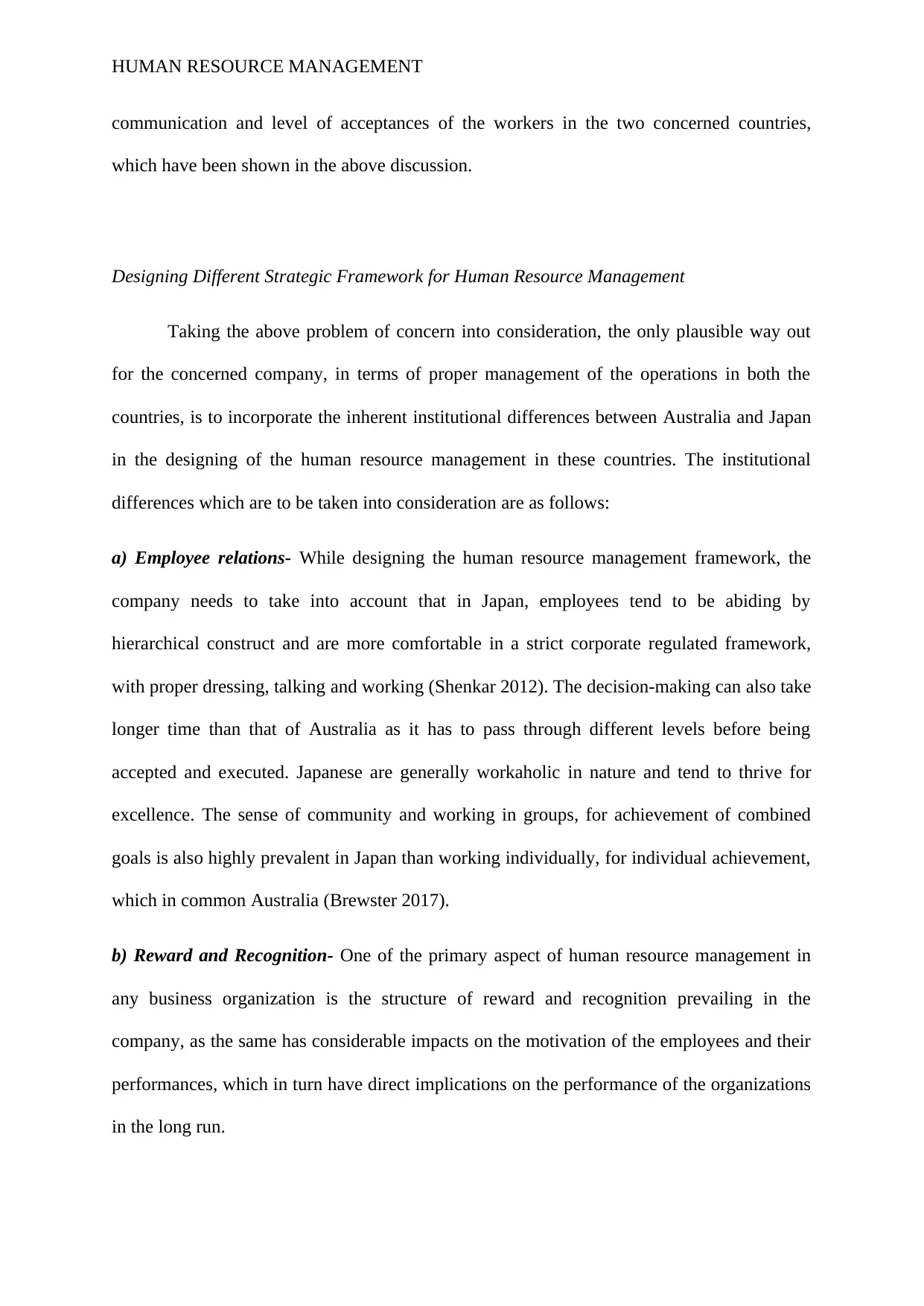
HUMAN RESOURCE MANAGEMENT
communication and level of acceptances of the workers in the two concerned countries,
which have been shown in the above discussion.
Designing Different Strategic Framework for Human Resource Management
Taking the above problem of concern into consideration, the only plausible way out
for the concerned company, in terms of proper management of the operations in both the
countries, is to incorporate the inherent institutional differences between Australia and Japan
in the designing of the human resource management in these countries. The institutional
differences which are to be taken into consideration are as follows:
a) Employee relations- While designing the human resource management framework, the
company needs to take into account that in Japan, employees tend to be abiding by
hierarchical construct and are more comfortable in a strict corporate regulated framework,
with proper dressing, talking and working (Shenkar 2012). The decision-making can also take
longer time than that of Australia as it has to pass through different levels before being
accepted and executed. Japanese are generally workaholic in nature and tend to thrive for
excellence. The sense of community and working in groups, for achievement of combined
goals is also highly prevalent in Japan than working individually, for individual achievement,
which in common Australia (Brewster 2017).
b) Reward and Recognition- One of the primary aspect of human resource management in
any business organization is the structure of reward and recognition prevailing in the
company, as the same has considerable impacts on the motivation of the employees and their
performances, which in turn have direct implications on the performance of the organizations
in the long run.
communication and level of acceptances of the workers in the two concerned countries,
which have been shown in the above discussion.
Designing Different Strategic Framework for Human Resource Management
Taking the above problem of concern into consideration, the only plausible way out
for the concerned company, in terms of proper management of the operations in both the
countries, is to incorporate the inherent institutional differences between Australia and Japan
in the designing of the human resource management in these countries. The institutional
differences which are to be taken into consideration are as follows:
a) Employee relations- While designing the human resource management framework, the
company needs to take into account that in Japan, employees tend to be abiding by
hierarchical construct and are more comfortable in a strict corporate regulated framework,
with proper dressing, talking and working (Shenkar 2012). The decision-making can also take
longer time than that of Australia as it has to pass through different levels before being
accepted and executed. Japanese are generally workaholic in nature and tend to thrive for
excellence. The sense of community and working in groups, for achievement of combined
goals is also highly prevalent in Japan than working individually, for individual achievement,
which in common Australia (Brewster 2017).
b) Reward and Recognition- One of the primary aspect of human resource management in
any business organization is the structure of reward and recognition prevailing in the
company, as the same has considerable impacts on the motivation of the employees and their
performances, which in turn have direct implications on the performance of the organizations
in the long run.
⊘ This is a preview!⊘
Do you want full access?
Subscribe today to unlock all pages.

Trusted by 1+ million students worldwide
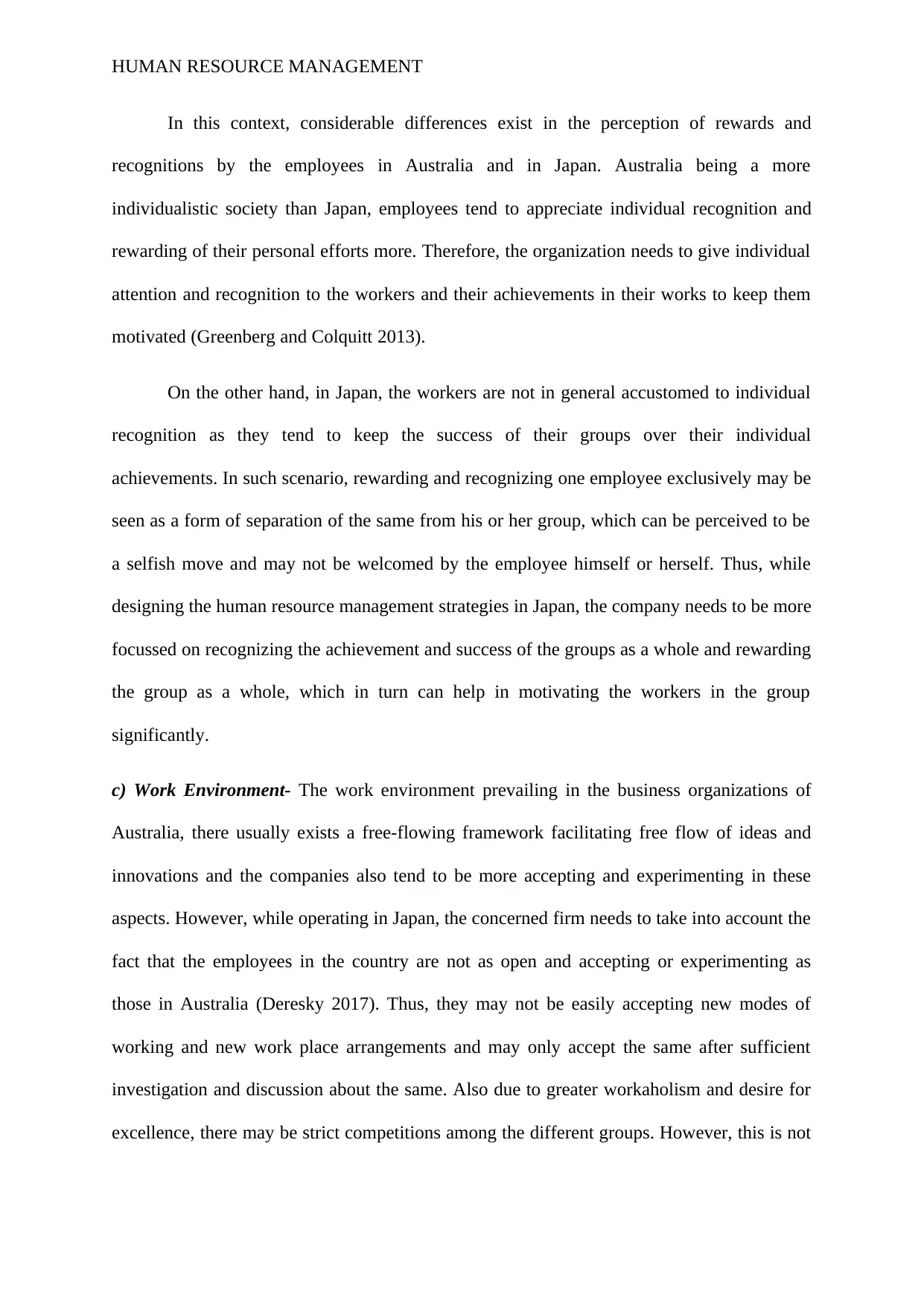
HUMAN RESOURCE MANAGEMENT
In this context, considerable differences exist in the perception of rewards and
recognitions by the employees in Australia and in Japan. Australia being a more
individualistic society than Japan, employees tend to appreciate individual recognition and
rewarding of their personal efforts more. Therefore, the organization needs to give individual
attention and recognition to the workers and their achievements in their works to keep them
motivated (Greenberg and Colquitt 2013).
On the other hand, in Japan, the workers are not in general accustomed to individual
recognition as they tend to keep the success of their groups over their individual
achievements. In such scenario, rewarding and recognizing one employee exclusively may be
seen as a form of separation of the same from his or her group, which can be perceived to be
a selfish move and may not be welcomed by the employee himself or herself. Thus, while
designing the human resource management strategies in Japan, the company needs to be more
focussed on recognizing the achievement and success of the groups as a whole and rewarding
the group as a whole, which in turn can help in motivating the workers in the group
significantly.
c) Work Environment- The work environment prevailing in the business organizations of
Australia, there usually exists a free-flowing framework facilitating free flow of ideas and
innovations and the companies also tend to be more accepting and experimenting in these
aspects. However, while operating in Japan, the concerned firm needs to take into account the
fact that the employees in the country are not as open and accepting or experimenting as
those in Australia (Deresky 2017). Thus, they may not be easily accepting new modes of
working and new work place arrangements and may only accept the same after sufficient
investigation and discussion about the same. Also due to greater workaholism and desire for
excellence, there may be strict competitions among the different groups. However, this is not
In this context, considerable differences exist in the perception of rewards and
recognitions by the employees in Australia and in Japan. Australia being a more
individualistic society than Japan, employees tend to appreciate individual recognition and
rewarding of their personal efforts more. Therefore, the organization needs to give individual
attention and recognition to the workers and their achievements in their works to keep them
motivated (Greenberg and Colquitt 2013).
On the other hand, in Japan, the workers are not in general accustomed to individual
recognition as they tend to keep the success of their groups over their individual
achievements. In such scenario, rewarding and recognizing one employee exclusively may be
seen as a form of separation of the same from his or her group, which can be perceived to be
a selfish move and may not be welcomed by the employee himself or herself. Thus, while
designing the human resource management strategies in Japan, the company needs to be more
focussed on recognizing the achievement and success of the groups as a whole and rewarding
the group as a whole, which in turn can help in motivating the workers in the group
significantly.
c) Work Environment- The work environment prevailing in the business organizations of
Australia, there usually exists a free-flowing framework facilitating free flow of ideas and
innovations and the companies also tend to be more accepting and experimenting in these
aspects. However, while operating in Japan, the concerned firm needs to take into account the
fact that the employees in the country are not as open and accepting or experimenting as
those in Australia (Deresky 2017). Thus, they may not be easily accepting new modes of
working and new work place arrangements and may only accept the same after sufficient
investigation and discussion about the same. Also due to greater workaholism and desire for
excellence, there may be strict competitions among the different groups. However, this is not
Paraphrase This Document
Need a fresh take? Get an instant paraphrase of this document with our AI Paraphraser
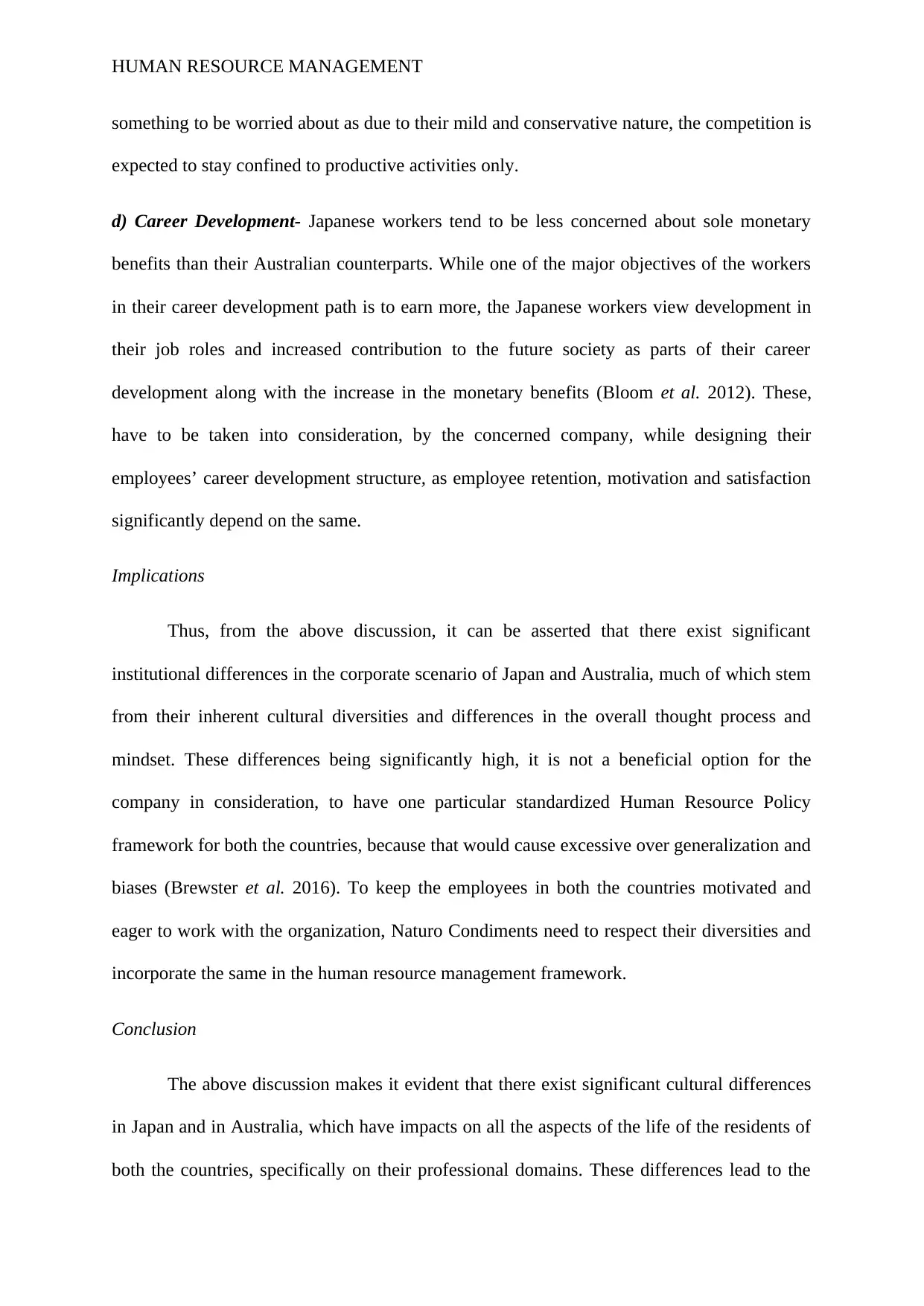
HUMAN RESOURCE MANAGEMENT
something to be worried about as due to their mild and conservative nature, the competition is
expected to stay confined to productive activities only.
d) Career Development- Japanese workers tend to be less concerned about sole monetary
benefits than their Australian counterparts. While one of the major objectives of the workers
in their career development path is to earn more, the Japanese workers view development in
their job roles and increased contribution to the future society as parts of their career
development along with the increase in the monetary benefits (Bloom et al. 2012). These,
have to be taken into consideration, by the concerned company, while designing their
employees’ career development structure, as employee retention, motivation and satisfaction
significantly depend on the same.
Implications
Thus, from the above discussion, it can be asserted that there exist significant
institutional differences in the corporate scenario of Japan and Australia, much of which stem
from their inherent cultural diversities and differences in the overall thought process and
mindset. These differences being significantly high, it is not a beneficial option for the
company in consideration, to have one particular standardized Human Resource Policy
framework for both the countries, because that would cause excessive over generalization and
biases (Brewster et al. 2016). To keep the employees in both the countries motivated and
eager to work with the organization, Naturo Condiments need to respect their diversities and
incorporate the same in the human resource management framework.
Conclusion
The above discussion makes it evident that there exist significant cultural differences
in Japan and in Australia, which have impacts on all the aspects of the life of the residents of
both the countries, specifically on their professional domains. These differences lead to the
something to be worried about as due to their mild and conservative nature, the competition is
expected to stay confined to productive activities only.
d) Career Development- Japanese workers tend to be less concerned about sole monetary
benefits than their Australian counterparts. While one of the major objectives of the workers
in their career development path is to earn more, the Japanese workers view development in
their job roles and increased contribution to the future society as parts of their career
development along with the increase in the monetary benefits (Bloom et al. 2012). These,
have to be taken into consideration, by the concerned company, while designing their
employees’ career development structure, as employee retention, motivation and satisfaction
significantly depend on the same.
Implications
Thus, from the above discussion, it can be asserted that there exist significant
institutional differences in the corporate scenario of Japan and Australia, much of which stem
from their inherent cultural diversities and differences in the overall thought process and
mindset. These differences being significantly high, it is not a beneficial option for the
company in consideration, to have one particular standardized Human Resource Policy
framework for both the countries, because that would cause excessive over generalization and
biases (Brewster et al. 2016). To keep the employees in both the countries motivated and
eager to work with the organization, Naturo Condiments need to respect their diversities and
incorporate the same in the human resource management framework.
Conclusion
The above discussion makes it evident that there exist significant cultural differences
in Japan and in Australia, which have impacts on all the aspects of the life of the residents of
both the countries, specifically on their professional domains. These differences lead to the
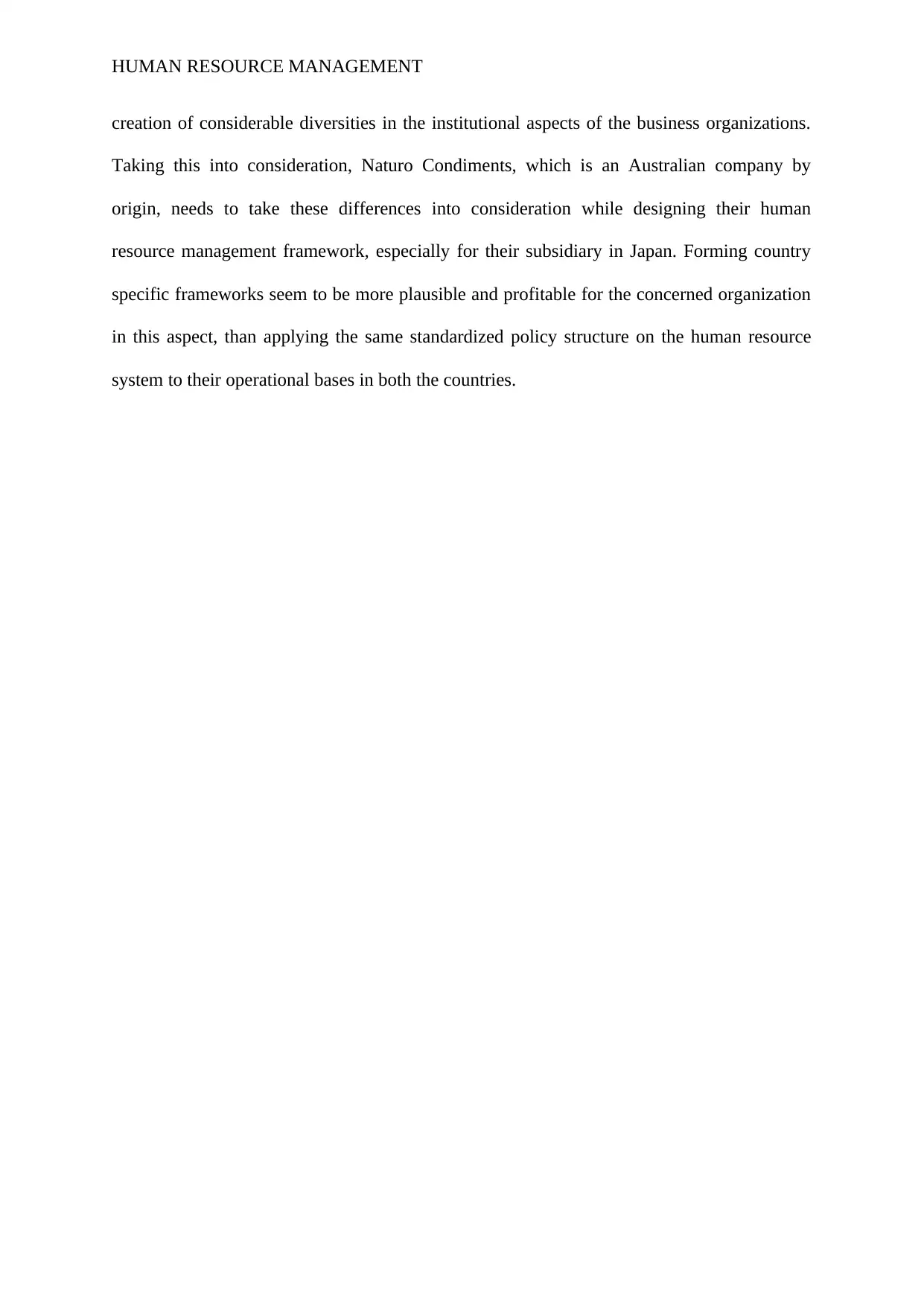
HUMAN RESOURCE MANAGEMENT
creation of considerable diversities in the institutional aspects of the business organizations.
Taking this into consideration, Naturo Condiments, which is an Australian company by
origin, needs to take these differences into consideration while designing their human
resource management framework, especially for their subsidiary in Japan. Forming country
specific frameworks seem to be more plausible and profitable for the concerned organization
in this aspect, than applying the same standardized policy structure on the human resource
system to their operational bases in both the countries.
creation of considerable diversities in the institutional aspects of the business organizations.
Taking this into consideration, Naturo Condiments, which is an Australian company by
origin, needs to take these differences into consideration while designing their human
resource management framework, especially for their subsidiary in Japan. Forming country
specific frameworks seem to be more plausible and profitable for the concerned organization
in this aspect, than applying the same standardized policy structure on the human resource
system to their operational bases in both the countries.
⊘ This is a preview!⊘
Do you want full access?
Subscribe today to unlock all pages.

Trusted by 1+ million students worldwide
1 out of 15
Related Documents
Your All-in-One AI-Powered Toolkit for Academic Success.
+13062052269
info@desklib.com
Available 24*7 on WhatsApp / Email
![[object Object]](/_next/static/media/star-bottom.7253800d.svg)
Unlock your academic potential
Copyright © 2020–2026 A2Z Services. All Rights Reserved. Developed and managed by ZUCOL.





